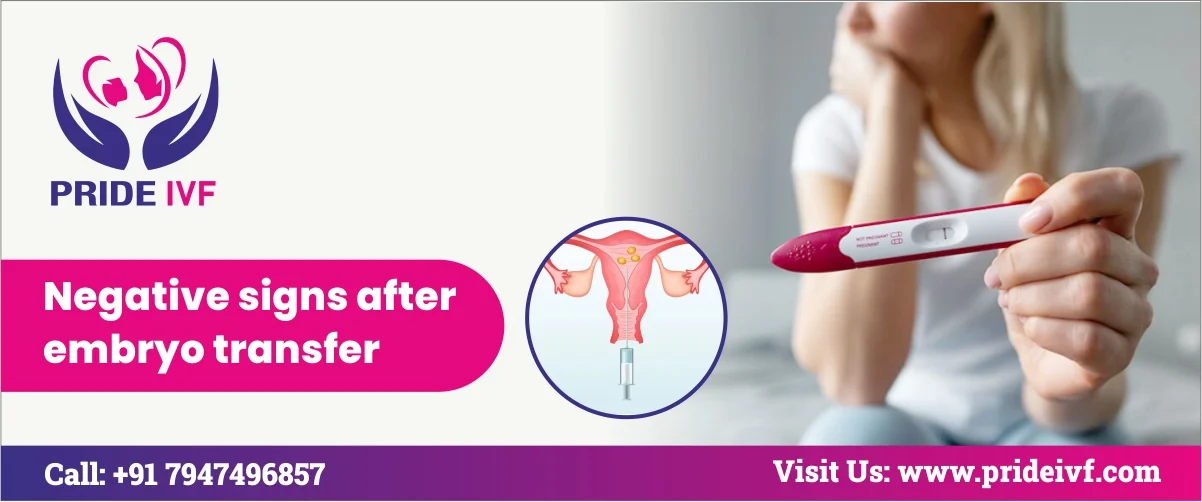In the process of assisted reproductive technology (ART), embryo transfer is an exciting and significant milestone, and the days that follow may be quite exciting. Even though many women report favorable feelings, it’s crucial to recognize any symptoms (after embryo transfer day by day symptoms) that can point to concerns or difficulties. After an embryo transfer, there is a lot of excitement and optimism in the days that follow, but it’s crucial to watch out for negative signs after embryo transfer.




Negative Signs After Embryo Transfer
You can seek prompt medical assistance and make informed choices by being aware of these warning indicators. This is a thorough look at the things to be aware of following an embryo transfer.
Excessive bleeding
One of the most worrying negative signs after embryo transfer is heavy bleeding. Heavy bleeding, as opposed to mild spotting or implantation bleeding, may indicate prospective problems including an ectopic pregnancy, a failed implantation, or a possible miscarriage. Inform your fertility expert right away if you have significant bleeding, especially if it is accompanied by excruciating discomfort.
Intense cramping
Severe cramping may be a sign of a problem, while minor cramping during the embryo’s implantation might be normal. Sometimes severe or ongoing cramping indicates an ectopic pregnancy or other issues. Seek medical assistance right away if the cramps are severe and don’t go away with rest, or if they are accompanied by significant bleeding.
Severe Pain
Abdominal or pelvic discomfort that is too severe is a serious worry. In contrast to mild and manageable pain, intense, severe, or unbearable discomfort needs to be assessed by a healthcare professional. This kind of discomfort might be one of the negative signs after embryo transfer of an ectopic pregnancy or ovarian hyperstimulation syndrome (OHSS).
Abnormal Discharge
Unusual discharge from the vagina may indicate issues. While increased discharge is often normal, discharge that is green or yellow, smells bad, or is accompanied by discomfort or itching may be an indication of an infection or other problems. You should report any notable changes in discharge to your reproductive clinic so they may be assessed
Consistent Vomiting or Nausea
Concern should be expressed if vomiting or nausea persists and does not get better. While moderate nausea or vomiting may be a natural side effect of hormonal changes, severe or ongoing nausea or vomiting may be one of the negative signs after embryo transfer of OHSS or another illness that needs to be checked out by a doctor.
Vertigo or Lightheadedness
After an embryo transfer, dizziness or fainting are uncommon but might be a sign of a more serious issue, such as dehydration or a procedure-related complication. Consult a physician if you feel lightheaded or faint so that you can rule out any underlying conditions.
Fever or a high temperature
After an embryo transfer, fever or chills may indicate an infection or other problems. It’s crucial to get in touch with your doctor if you have chills or a fever so they can rule out any infections or other medical issues.
Missing of Signs
While the absence of symptoms does not always indicate a failed transfer, it might raise red flags for some people. See your reproductive expert for additional assessment if you usually have symptoms but all of a sudden notice none at all, particularly if there are other worrisome signals.
Emotional or Anxious Distress
Although it doesn’t have a physical manifestation, severe anxiety or mental anguish can have an adverse impact on your wellbeing. It might be quite stressful to wait and worry about the result. Seek assistance from a mental health professional or counselor if anxiety becomes uncontrollable or has a substantial impact on your day-to-day activities.
Medication Not Responding
It’s crucial to speak with your healthcare practitioner if you take supplements or medications after the transfer and find that your symptoms are becoming worse or that there is no improvement. Since the purpose of medication is to control symptoms and aid in the implantation process, a lack of improvement may be a negative sign of an issue.
Lets get started
HCG Level in negative embryo transfer
Soon after implantation, the placenta secretes the hormone known as HCG. It is the hormone that pregnancy tests assess to confirm pregnancy and may be found in the blood and urine. HCG levels are tracked in assisted reproductive technologies (ART) to evaluate the efficacy of an embryo transfer.
HCG levels are often very low or undetectable following a negative embryo transfer. A level of HCG level after embryo transfer less than 5 mIU/mL is regarded as negative for pregnancy. This suggests that either implantation failed or the embryo did not grow to a satisfactory stage.
HCG levels that were originally detected but then began to fall may be a sign of a failed implantation or a biochemical pregnancy, which is a very early miscarriage. Under those circumstances, HCG levels would ultimately fall to zero.
Finding out you have a negative HCG result can be stressful. To help you deal with the emotional parts of the procedure, it’s crucial to have assistance from your counselor, support group, or healthcare professional. Recall that many people are successful in becoming pregnant after repeated cycles, and that a single negative result does not always indicate future results.
However, your fertility expert can suggest more testing or a follow-up session to go over the results if your HCG levels are low or negative. This aids in figuring out your treatment plan’s subsequent phases. To determine what could have affected the result, your fertility doctor may assess the entire IVF cycle, taking into account the quality of the embryos and the overall response to treatment.
Your specialist will probably choose next actions based on the results. This might entail changing the course of treatment, attempting a different cycle, or looking at other possibilities.
Why Pride IVF?
As one of the top IVF centre in Delhi, Pride IVF is committed to providing you with individualized attention and state-of-the-art equipment to help you realize your dream of becoming a parent. Our mission is to meet your specific requirements with complete, humane, and successful reproductive therapies. Examine our selection of services that are intended to assist you at every stage of your quest for a fruitful conception.
Our IVF program is intended to help people who have tried unsuccessfully with other procedures become pregnant, as well as couples. To maximize your chances of success, our skilled staff employs the most advanced technologies for fertilization, embryo transfer, and egg retrieval. To ensure the greatest possible result, each stage of the process is managed precisely and carefully.
We design individualized treatment plans based on your unique requirements and situation, giving you a tailored strategy to assist you reach your objectives.Our staff is committed to providing you with individualized care, compassion, and understanding throughout your reproductive journey.
Starting the IVF process to become a parent may be an exciting and intimidating experience. We at pride IVF clinic are here to provide you with specialized care and individualized attention at every stage of the process. Make an appointment for a consultation with us right now to begin the process of realizing your goal of becoming a parent.
Takeaway:
It might be distressing to have unpleasant symptoms following an embryo transfer, but it’s important to keep in mind that not all symptoms indicate an issue. However, you can assist address any difficulties early by being watchful and getting fast medical treatment when you notice any of the above described indicators. Maintaining regular follow-up meetings and maintaining open contact with your fertility specialist are essential to guaranteeing the best potential outcome for your treatment.
It can be difficult to navigate the post-embryo transfer period, but you can handle this crucial time with confidence and care if you are proactive about your health and keep educated.
FAQs
Q) What are a few common warning signs following an embryo transfer?
Following an embryo transfer, unfavorable symptoms that are frequently observed include excessive bleeding, intense cramps, intense pain, irregular vaginal discharge, prolonged nausea or vomiting, disorientation, and fever. These signs could point to possible difficulties or problems during the transfer of the embryo.
Q) What does severe bleeding following embryo transfer mean?
Excessive bleeding might indicate a miscarriage or unsuccessful implantation, particularly if it mimics a menstrual period or is accompanied by excruciating pain. While little spotting may be typical, severe bleeding has to be reported right away to your reproductive doctor.
Q) What steps should I take if my nausea or vomiting doesn’t go away?
Ovarian hyperstimulation syndrome (OHSS) or other problems may be the cause of persistent nausea or vomiting following an embryo transfer. See your doctor if you suffer from severe or persistent nausea so you can determine the reason and get the right therapy.




